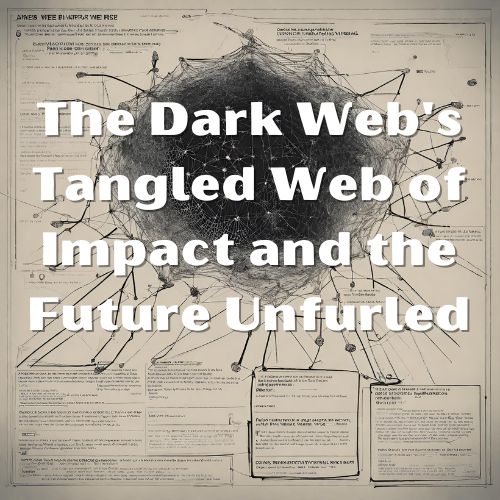The whispers of the dark web echo beyond the confines of illegal transactions and hidden marketplaces. This chapter unravels the broader societal impact, explores legitimate use cases, delves into ongoing law enforcement challenges, and peers into the murky crystal ball of the future, urging critical reflection on the ethical considerations this enigmatic realm presents.
A Double-Edged Sword: Societal Impact Unmasked
The dark web’s shadow stretches far, its impact rippling through society like a pebble cast into a pond. While facilitating nefarious activities like drug trafficking and cybercrime, it also empowers individuals and groups seeking privacy and freedom in regimes with oppressive censorship. Journalists communicate securely, activists organize under tight control, and whistleblowers expose wrongdoing away from prying eyes. This duality forces us to grapple with complex questions: Is anonymity a fundamental right, or does it shield the nefarious? Where do we draw the line between legitimate privacy and criminal activity?
Beyond the Illicit: Legitimate Use Cases in the Shadows
The dark web isn’t just a haven for the illicit. It offers a platform for individuals seeking anonymity for legitimate reasons. Privacy-focused browsers like Tor protect journalists reporting from repressive regimes, allowing them to share crucial information without fear of reprisal. Activists in authoritarian states organize protests and disseminate information beyond government surveillance. Individuals concerned about data privacy purchase anonymity-enhancing tools and services to shield themselves from intrusive corporate and government data collection. These use cases raise vital questions about privacy rights in the digital age and challenge us to think beyond the stereotypical portrayal of the dark web as a criminal haven.
The Cat and Mouse Game: Law Enforcement’s Sisyphean Task
Combating dark web activities is a constant struggle for law enforcement, akin to Sisyphus pushing a boulder uphill only to see it roll down again. Complexities with jurisdiction, anonymization tools, and constantly evolving technologies make tracking criminals and shutting down marketplaces difficult. Europol’s takedown of Hydra in 2023 illustrates the challenges: while a victory, it likely led to the fragmentation and emergence of smaller, more agile platforms. The battle between law enforcement and dark web actors is a continuous dance, demanding innovative strategies and international cooperation to stay ahead of the curve.
Gazing into the Crystal Ball: Future Trends and Ethical Crossroads
Predicting the future of the dark web is like gazing into a murky crystal ball, reflecting competing possibilities. We might see increased government regulation, aiming to curb illegal activities but potentially infringing on individual privacy rights. Technological advancements in AI and surveillance could empower law enforcement, but also raise concerns about mass data collection and misuse. Decentralized technologies like blockchain could create even more anonymous and resilient dark web structures, posing further challenges for authorities. Navigating these potential futures requires thoughtful dialogue and ethical considerations.
The Balancing Act: Navigating the Ethical Gray Area
The dark web presents a complex ethical landscape, demanding nuanced approaches. Striking a balance between security and privacy is crucial. While protecting individuals from criminal activities is vital, overreaching surveillance measures can infringe on fundamental rights. Fostering open dialogue and public awareness about the dark web’s complexities is essential. Empowering individuals with digital literacy skills and promoting responsible use of privacy tools can help mitigate risks and encourage ethical engagement with this enigmatic online space.
Ultimately, the impact of the dark web transcends the headlines. It’s a multifaceted phenomenon forcing us to confront challenging questions about privacy, security, and the future of the digital world. By acknowledging its complexities, engaging in open discussion, and prioritizing ethical considerations, we can navigate this uncharted territory responsibly and ensure it serves the greater good of humanity.

